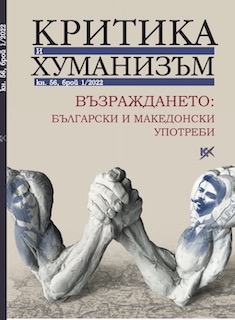Македонизъм – видове и начини на употреба
Macedonianism: Its Types and Methods of Use
Author(s): Lachezar StoyanovSubject(s): History, Local History / Microhistory, Modern Age, 19th Century
Published by: Фондация за хуманитарни и социални изследвания - София
Keywords: Macedonia; Macedonianism; Macedonian Question; Bulgarian-Macedonian relations; IMRO; European Union; Bulgaria; Serbia; Russia; Yugoslavia; Comintern; Republic of North Macedonia
Summary/Abstract: The history of the Macedonian question is traced in this article in order to explain the reasons for the Bulgarian veto on the start of the negotiations with the Republic of North Macedonia (RNM) for accession to the EU. The ideological core of that question is Macedonianism. The main emphasis is on the circumstance that this term refers to two types of interpretations of the past, different in their origins and aims, and to the essence of the modern Macedonian political nation. The first type of Macedonianism originated in Bulgarian environment and under the influence of the juncture exhibits different manifestations but insist on preservation of the ties with Bulgaria, living kinship ties and recognition of their Bulgarian roots. The second type of Macedonianism denies any ethnic and cultural ties with the Bulgarians. It was formulated by the Serbs, supported by Russia and received support from other countries, because it consolidates the status quo created by them against the ethnically motivated Bulgarian aspirations for national unification. With the same motives the USSR revived again this type of Macedonianism in 1934 through the Comintern. Despite its directive, the Bulgarian and Yugoslav communists continued to have sharp clashes over the Macedonian question, even after taking power after 1945. Due to the application of the two alternative versions of Macedonianism after the 1960s, it became one of the sharpest point in the relations between Bulgaria and Yugoslavia. These two variants of Macedonianism were in sharp conflict in the Macedonian Republic formed after 1944 and are manifested in the contemporary RNM. Despite the official policy of erasing any common past with Bulgaria brutally followed to this day, many people still feel being Bulgarians, and already 120 000 have declared their Bulgarian roots and have Bulgarian citizenship. Their persecution because of their self-determination or origins is contrary to the EU's founding principles. On the top of that the thesis of our common past is included in the bilateral Bulgarian-Macedonian agreement of 2017. Bulgaria's position on the recognition of the Macedonian political nation is in support of the policy of recognizing and stabilizing the status quo. But it is very important what kind of partner we will have in the EU. Would the behavior of the RNM be different if we legalize trough the negotiations a tolerant Bulgarian-based Macedonianism or an anti-Bulgarian one, the latter being also anti-European, Yugo-Communist, supported by Serbia, supported by Russia, and increasingly openly by China.
Journal: Критика и хуманизъм
- Issue Year: 1/2022
- Issue No: 56
- Page Range: 177-200
- Page Count: 24
- Language: Bulgarian
- Content File-PDF

